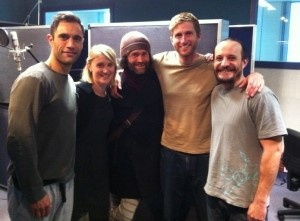TE AWARUA
11/04/2020 - 31/05/2020
COVID-19 Lockdown Festival 2020
Production Details
In a trench in north-east France, three peoples paths converge. At stake is the town of Le Quesnoy and her would-be liberators, the NZ Division.
Te Awarua by Albert Belz
Broadcast 16 Nov 2014
Listen duration53′ :39″
Cast: Jade Daniels, Sophie Lindsay, Nigel Collins, Robert Tripe, Tola Newbery, Kimo Houltham and Te Maiau Houltham
Theatre , Audio (podcast) ,
54 mins
Beautiful blend of comedy and tragedy; heart-breaking yet hopeful
Review by Acushla-Tara Kupe 21st Apr 2020
Te Awarua (The Trench) was originally written in 2003 as a stage play by Albert Belz when he was in residency in Les Quesnoy. A decade later it was staged by Te Rehia theatre company as part of the Armistice Day celebrations before an Auckland season, and finally found its way onto RNZ as this radio play produced by Jason Te Kare in 2014.
“Once the gates of war have been flung open, man no longer pays notice to the light of reason.” – Celadine.
Te Awarua follows the story of three seemingly disparate individuals who find themselves huddled in a trench not far from Les Quesnoy near the end of World War 1. Brought together by fate, they work together to fight their common enemy, although through this enforced camaraderie we see fragments of pre-war judgements and assumptions leaking through the cracks.
We open with Tawera who is on a mission to build the greatest fortification of all time, in an effort to kill as many of the enemy as possible. He’s joined by French woman Celandine, who is attracted to Tawera’s trench when she hears him playing his koauau. Following her dream, she believes this sound will lead her to her lover.
Tawera shares the story of Hinemoa and Tutanekai with Celandine, during which they are joined by Pakeha soldier William. Celandine responds with her own love story, equally full of poetry and metaphor. The tension builds as she discovers her lover Phillipe is injured in the fields close to their trench, but under enemy fire they are unable to get to him. Tawera, Celandine and William band together to kill the enemy and rescue Phillipe, all before the planned liberation of Le Quesnoy by the New Zealand troops.
Seeds planted throughout this radio play come to fruition as the stories begin to intertwine in a way that leads to a classic twist and heartbreaking but hopeful ending.
The performances of every actor involved really support Belz’s words and Te Kare’s direction. Jade Daniels is grounded and stoic as Tawera, Sophie Lindsay takes us through Celadine’s past with passion and present with determination, and Nigel Collins shines as William, moving through the realisation of his reality with heartbreaking acceptance.
Robert Tripe, Tola Newbery, Kimo Houltham and Te Maiau Houltham round off the strong ensemble. A special mention must go to Te Maiau for her gorgeous rendition of ‘E Pari Rā’; a truly beautiful voice that holds and communicates the emotional state of Hinemoa beautifully.
Belz has taken a story often told and rewritten it to be accessible through the common language of love, whatever form it takes. He uses Māori myth, wairuatanga, western storytelling, and weaves them all together to tell a story of war through the lens of love, hope, and alliance.
What I love about Albert Belz’s writing is how he is able to blend comedy and tragedy so beautifully together. The humanity and honesty of every character allows you to laugh with them then weep for them, all within the same minute. A truly stunning playwright.
The sound engineering by Phil Benge is impeccable. We are taken seamlessly from trench to orchard to Rotorua, from past to present, without ever losing our way. The inclusion of Māori and French instruments helps set the scene, but it’s the ambient noise and general atmosphere that set the tone. Each moment transitions perfectly into one another and the pictures painted tautoko Belz’s writing and the actors performances superbly.
Te Awarua is a grounded humanisation of the liberation of Le Quesnoy, highlighting the love, loss and comradeship felt during times of war. A truly heart-breaking yet hopeful meeting of cultures and common needs.
Copyright © in the review belongs to the reviewer





Comments